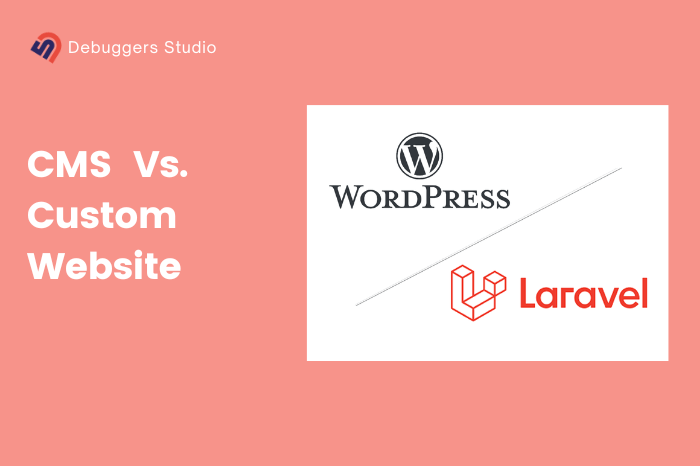WordPress has become the most popular Content Management System (CMS) website builder for small businesses in recent times. According to W3Techs, WordPress has seen a significant increase in usage. In 2011, it was used by 13.1% of websites, and since then, its usage has grown by an average of 12% each year. By 2022, it reached a whopping 43.2%.
WordPress is a great choice for small businesses, but it does have some limitations when it comes to building a website. However, WordPress offers a solution to overcome these limitations through plugins. These plugins can help meet the specific goals and requirements of your business.
In this article, I’ll share a list of helpful plugins and their impact on WordPress websites.
Why You Need Plugins for Your WordPress Website?
Website plugins are individual services that can be added to your website to extend its functionality. You can use plugins to change visual elements, add extra information or content, and integrate your website with other tools. Plugins can also add completely new features to your website.
If you’re looking to extend the functionality of your website, plugins are great option. With so many plugins to choose from, you’re sure to find one that meets your needs.
Here are a few points to highlight some of the ways in which plugins can supercharge your website:
- Lightning-fast loading times
- Stunning effects and interactive galleries
- Improve user experience
- Dominate search engine rankings
- Customize your site effortlessly
- Maximize sales and conversions
- Shield your site from threats
- Understand your audience better
- Accessible on any device
- No coding headaches.
- Generate Leads and Sales
You may also find useful: Is WordPress Good For Small Business Websites?
13 Mandatory WordPress Plugins EVERY Small Business Needs
Choosing the right plugins and tools to help your online business can be difficult, as there are over 60,000+ WordPress plugins available.
To help you out, we have handpicked 13 plugins that are perfect for small businesses. These plugins will help you grow your business smoothly that align your business needs.
1. Elementor
Elementor is not just a popular WordPress plugin; it is a game-changer in the world of website building. With its powerful features and intuitive interface, Elementor empowers small businesses to create visually stunning website without the need for any coding knowledge.
Key Features:
- Drag-and-drop functionality
- Revolutionizes website design and customization
- Effortlessly drag elements from sidebar and drop onto desired location
- Quick, seamless process with no coding required
- Ideal for small business owners looking to establish online presence
- Extensive library of pre-designed templates, blocks, and widgets
- Templates cover various industries and purposes
- Templates fully customizable (colors, fonts, layouts)
- Extensive collection of widgets to enhance website functionality
- Contact forms, image galleries, testimonials, and more available
- Prioritizes responsiveness and mobile-friendliness
- Websites adapt seamlessly to different devices and screen sizes
- Ensures consistent and optimized user experience on desktops,laptops, tablets, and smartphones.
Cons:
- Steep for beginners without prior experience.
- Can result in slower loading times with complex elements or heavy templates
- Some WordPress themes may not work well with Elementor
- Drag-and-drop functionality may add excess code, impacting performance and SEO
- Advanced features and additional templates often require a Elementor Pro subscription, not ideal for budget-conscious users
- May experience conflicts when using Elementor alongside other page builder plugins
- The free version has design customization limitations and lacks advanced features
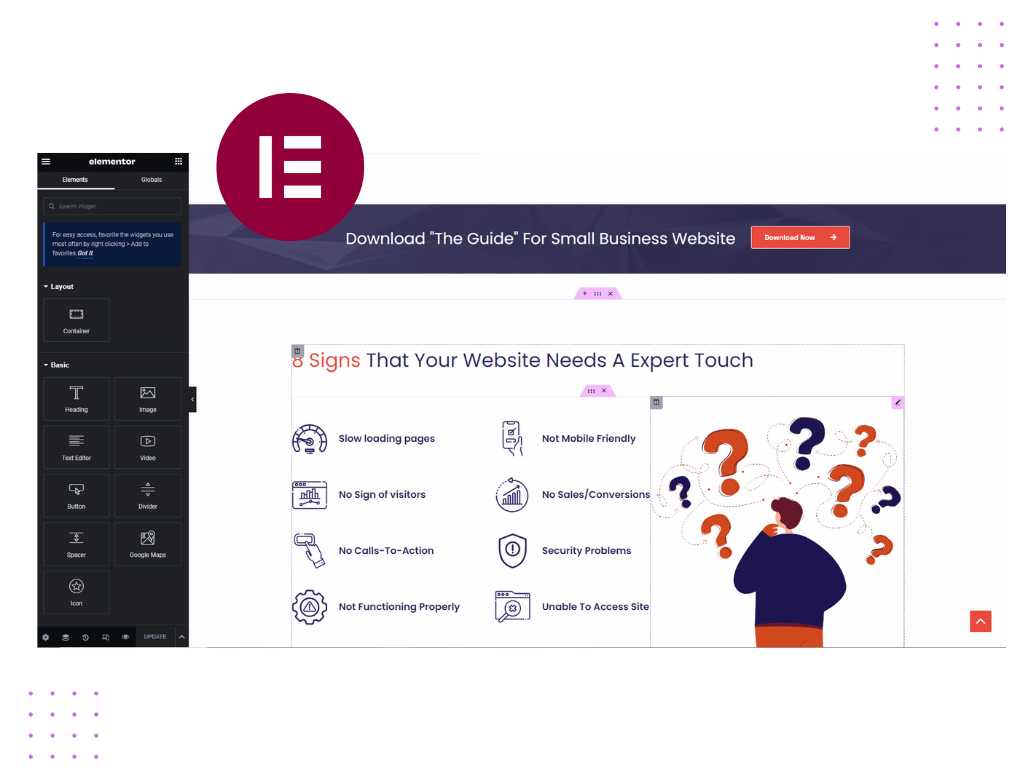
Pricing:
Elementor offers both a free and paid version. The free version of Elementor is a great option for beginners who want to create a simple website. The paid version of Elementor is Elementor Pro. It offers more features and support options.
Alternative:
Here are a few alternatives to Elementor: Beaver Builder, Divi Builder, Visual Composer:
2. WP Forms
WPForms is a popular plugin for WordPress that provides an intuitive drag-and-drop interface. It helps user to create and manage various types of forms on their websites. This includes contact forms, feedback forms, registration forms, survey forms, and more.
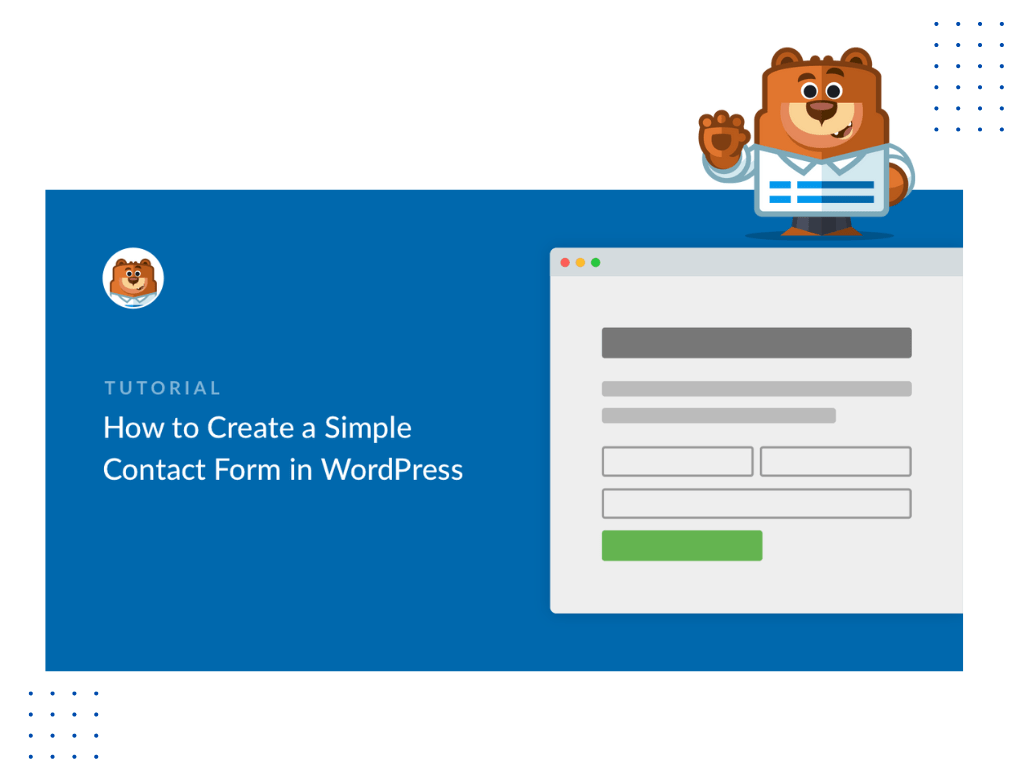
Let’s take a closer look:
Contact Forms:
With WPForms, you can create customized contact forms that include fields like name, email, phone number, and message. Additionally, you can set up automatic email notifications to receive inquiries instantly.
Lead Generation:
WPForms works well with popular email marketing services. It helps you collect leads and build your email list effortlessly.
Payment and Order Forms:
For small businesses involved in online sales of products or services, WPForms offers a solution for creating secure payment forms and order forms.
Surveys and Polls:
Understanding customer preferences and gathering feedback is important for improving products and services.You can use WPForms to create surveys and polls, to gather valuable insights. By analyzing the results, you can make data-driven decisions to enhance your business strategies.
User Registration Forms:
If your website requires user registrations, such as membership sites or online communities, WPForms simplifies the process of creating user registration forms. You have the flexibility to customize the fields and efficiently manage the user registration process.
Cons:
- The free version of WPForms has limited features.
- Access to more advanced features and addons may require a premium subscription.
- Some beginners may find WPForms’ interface and customization options slightly challenging to navigate at first.
- Certain features may require installing additional addons, which could lead to plugin bloat and potential conflicts.
- Users may encounter limitations in customizing form designs to match their specific needs.
- WPForms relies on the website’s default SMTP settings, which may cause email delivery issues for some users.
- The free version of WPForms has limited conditional logic capabilities.
- Some users may find it complicated to operate.
Pricing:
WPForms offers a free version with limited features, and its pricing varies for different premium plans.
Alternative:
Here are few other popular options: Gravity Forms, Contact form 7, Ninja Forms
3. WP Rocket
WP Rocket is a premium caching plugin for WordPress websites. It is designed to improve the performance and speed of your WordPress site by implementing various caching techniques.
Caching is the process of storing frequently accessed website data in a temporary storage location (cache) to reduce the time it takes to load a webpage. When a user visits a website that has WP Rocket installed, the plugin generates static HTML pages of the website’s dynamic content. These static pages are then served to subsequent visitors, resulting in faster page loading times.
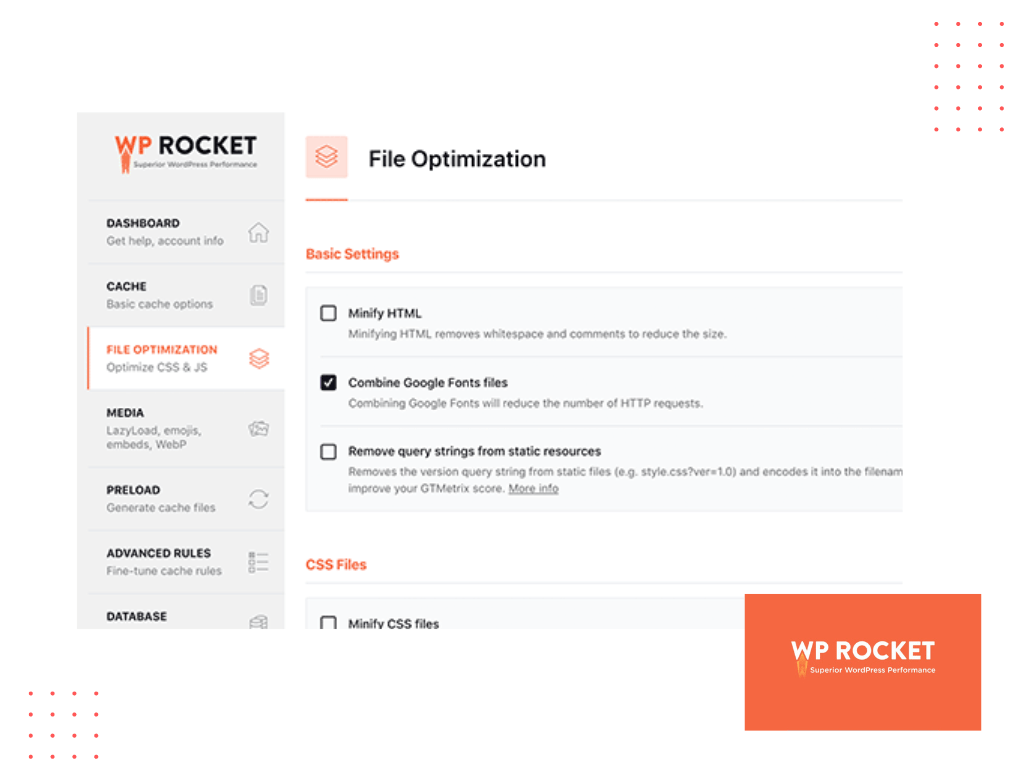
Key Features
- WP Rocket offers a user-friendly interface and easy setup
- WP Rocket creates cached static HTML pages.
- Instructs visitors’ browsers to cache certain static resources, like images, CSS, and JavaScript files.
- Enables GZIP compression to reduce file size and improve page loading speed.
- Automatically minimizes and combines CSS and JavaScript files, reducing HTTP requests made by the browser.
- Provides an option for lazy loading, delaying the loading of images and videos until users scroll down the page.
- Includes a feature to clean up and optimize the WordPress database.
- Seamlessly integrates with Content Delivery Networks (CDNs) to serve static files from multiple server locations worldwide.
Cons:
- WP Rocket doesn’t have a fully functional free version
- Some users might find WP Rocket’s settings and configuration options overwhelming
- After purchasing a WP Rocket license, users are entitled to updates and support for a limited period
- WP Rocket does not include certain advanced features found in other caching plugins.
- As WP Rocket handles various caching and optimization tasks, it might lead to plugin bloat.
Pricing:
WP Rocket offers premium pricing for its caching plugin, and there is no free version available.
Alternative:
Nitropack, WP-Optimize, and Breeze
4. WP Mail SMTP
WP Mail SMTP addresses email delivery issues and improves the reliability of email notifications sent from your WordPress website. SMTP (Simple Mail Transfer Protocol) is the standard protocol used for sending emails over the internet. By default, WordPress uses the PHP mail function to send emails, which can sometimes encounter problems, such as emails being marked as spam or not being delivered at all.
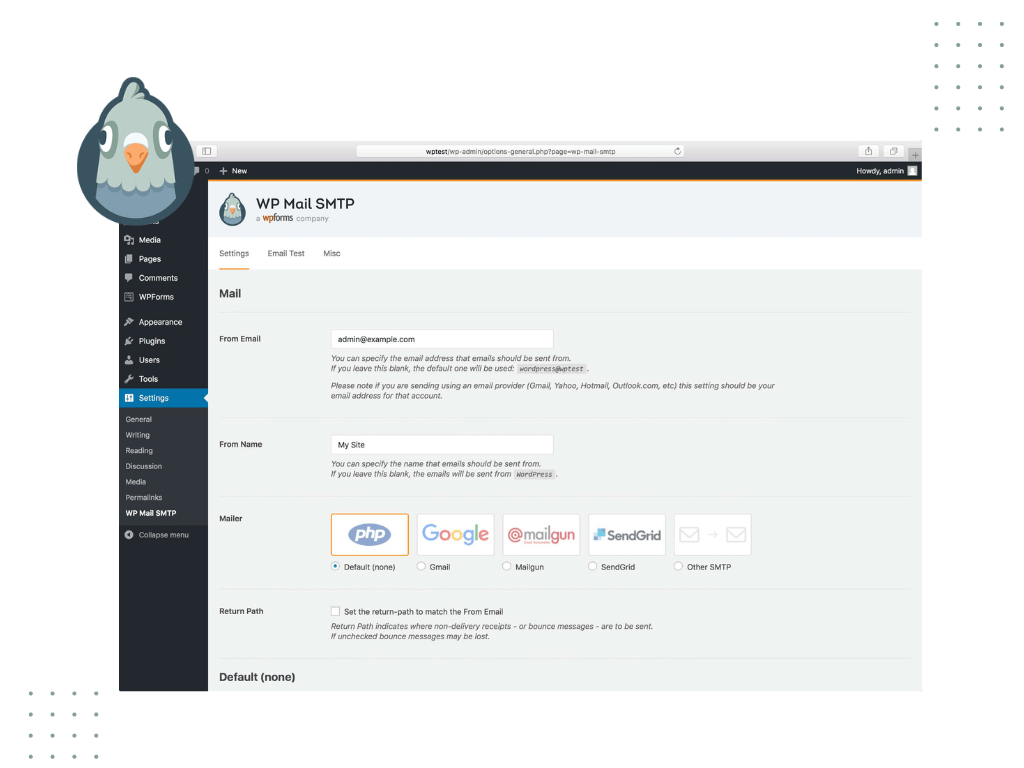
Key Features:
- WP Mail SMTP plugin allows you to easily configure your WordPress website to use a proper SMTP server for sending emails.
- It integrates seamlessly with popular email service providers like Gmail, Outlook, SendGrid, and more.
- Ensures reliable delivery of important email notifications.
- Overcomes email delivery issues and reduces the chances of emails being marked as spam.
- Establishes trust with email service providers by authenticating your emails through an SMTP server.
Cons:
- Setting up WP Mail SMTP can be challenging for users with limited technical knowledge.
- WP Mail SMTP may experience conflicts with other plugins
- The free version of WP Mail SMTP has certain limitations.
- Dependency on third-party email services
- Those unfamiliar with SMTP protocols may find it difficult to troubleshoot email problems or set up the plugin correctly.
- Free users may have limited access to customer support.
Pricing:
WP Mail SMTP has both a free version and a premium version with different pricing plans.
Alternative:
5. WooCommerce
WooCommerce is a very popular tool that helps you create an online store using your WordPress website. It has a free version that you can easily add to your site. Developed by WooThemes in 2011 and now owned by Automatic, the company behind WordPress.com.

Key Features:
- Transforms your WordPress site into a hassle-free, full-fledged online store.
- It offers all the essential features for effective product selling and management.
- Easily add and manage products, keep track of inventory, and process payments securely.
- Take control of shipping options and customize your store’s appearance to match your brand.
- A vibrant community of developers continuously creates additional features and designs for WooCommerce.
- Enjoy the flexibility and scalability of WooCommerce, suitable for businesses of all types.
- User-friendly interface empowers you to sell products online without technical expertise.
- Opening an online store becomes a smooth and enjoyable experience with WooCommerce.
- It also comes with easy payment methods
Cons:
- Can be resource-intensive on hosting servers
- May require additional extensions for certain features
- Updates may occasionally cause compatibility issues with themes or plugins
- Limited customer support for free users
- Customization may require basic coding knowledge
- Managing a large inventory can be time-consuming without additional tools
- Occasional security vulnerabilities due to its popularity as a target for attacks
- Some advanced features locked behind premium extensions or add-ons
- Occasional plugin conflicts with other WordPress plugins.
Pricing:
WooCommerce offers a free version that can be downloaded and used without any cost. However, it also has various paid extensions, add-ons, and premium themes available for purchase.
Alternatives:
There are no alternative plugin for Woo-commerce on WordPress.
6. Rank Math
Rank Math is a WordPress SEO plugin that helps website owners optimize their content for search engines. It offers a range of features and tools designed to improve a website’s visibility in search engine results pages (SERPs) and increase organic traffic.
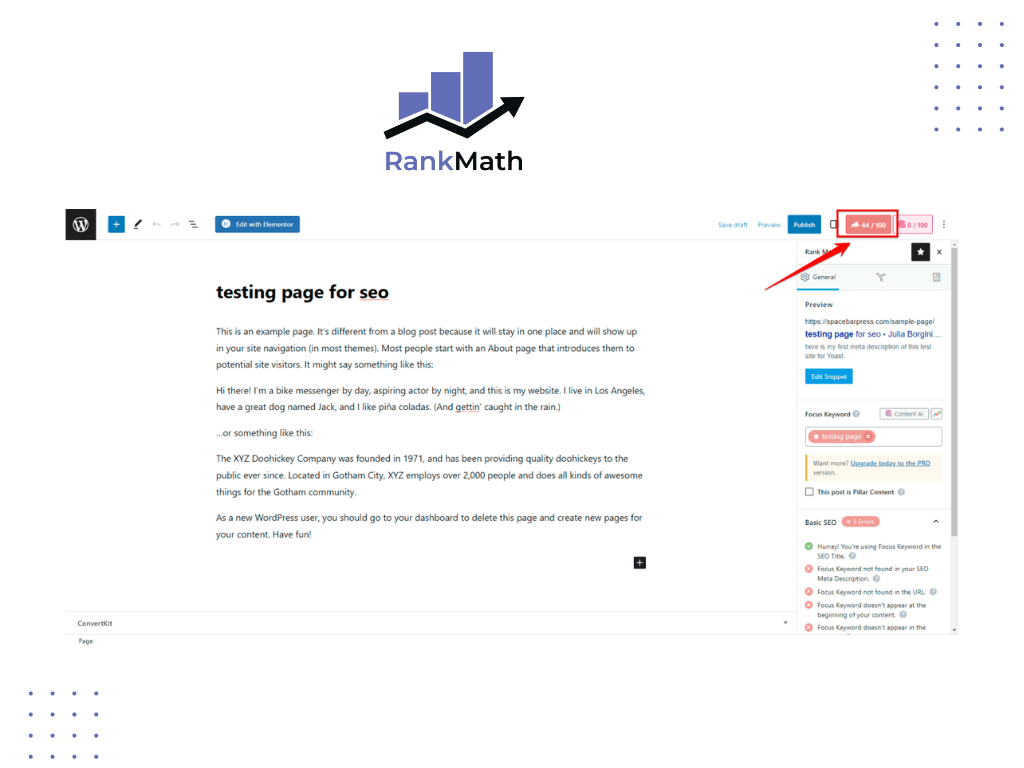
Key Features
- On-page SEO analysis and recommendations
- Keyword optimization and focus keyword suggestions
- XML sitemap generation and submission
- Rich snippet and schema markup options
- Google Search Console integration
- 404 error monitoring and redirections
- Internal linking suggestions for better site structure
- Advanced SEO settings for experienced users
- Automated image SEO optimization
- Local SEO optimization features
- WooCommerce SEO integration for online stores
- Breadcrumbs navigation support
- Social media metadata optimization
- Automated video SEO support
Cons:
- Occasional compatibility issues with other plugins/themes
- Some advanced features are locked behind a premium version
- Limited customer support for free users
- Frequent updates may cause occasional bugs or issues
- The plugin may become resource-intensive on larger websites
- Occasional conflicts with other SEO plugins
- Limited documentation or tutorials for some features.
Pricing:
Rank Math has both a free version and a premium version.
Alternatives:
Yoast SEO, All in One SEO Pack, SEOPress
7. Member Press
Website owners can effortlessly create and manage membership sites using MemberPress. It’s a well-known WordPress membership plugin. It helps users to restrict access to specific content, pages, and digital products based on membership levels or subscriptions.
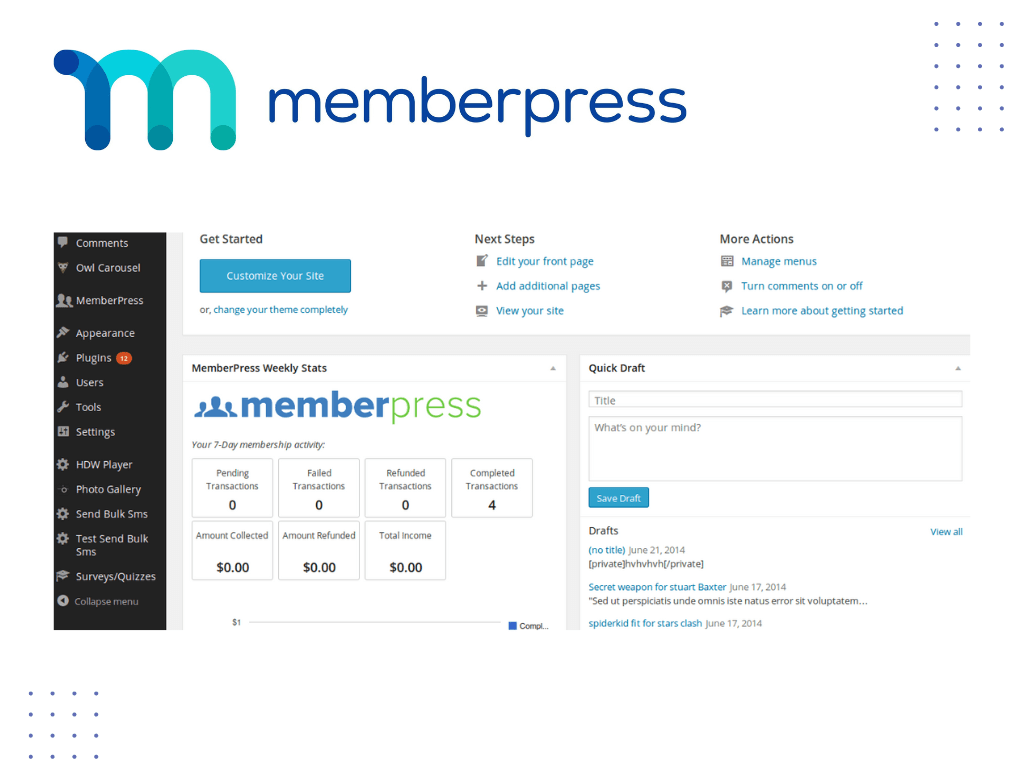
Key Features:
- Membership management and access control for WordPress sites.
- Easy creation and management of membership levels and subscriptions.
- Integration with popular payment gateways for secure and convenient transactions.
- Content restriction and drip content functionality for delivering content gradually over time.
- Built-in affiliate program support for rewarding referrals and driving more sign-ups.
- Detailed reporting and analytics to track membership performance and revenue.
- Customizable pricing pages and checkout forms to match the website’s branding.
- Automated email notifications for member onboarding and subscription reminders.
- Integration with popular email marketing services to communicate with members effectively.
- Compatibility with various third-party plugins and tools for extended functionality.
Cons:
- No built-in affiliate management system
- Limited payment gateway integrations in the basic plan
- Advanced features locked behind higher-priced plans
- Occasional compatibility issues with certain themes or plugins
- Support may be limited for users on lower-tier plans
- Can be resource-intensive on hosting servers with a large number of members
- Limited design customization options for membership pages without custom coding
- Occasional software updates may cause minor glitches or conflicts.
Pricing:
MemberPress does not have a free version. It is a premium WordPress membership plugin, and its pricing varies based on the plan selected.
Alternatives:
Restrict Content Pro, Paid Memberships Pro, WooCommerce Memberships
8. Duplicator
The Duplicator plugin empowers users to effortlessly migrate, clone, or back up their WordPress websites. It is a popular tool used by website developers, administrators, and anyone who needs to move their WordPress site to a new hosting provider.
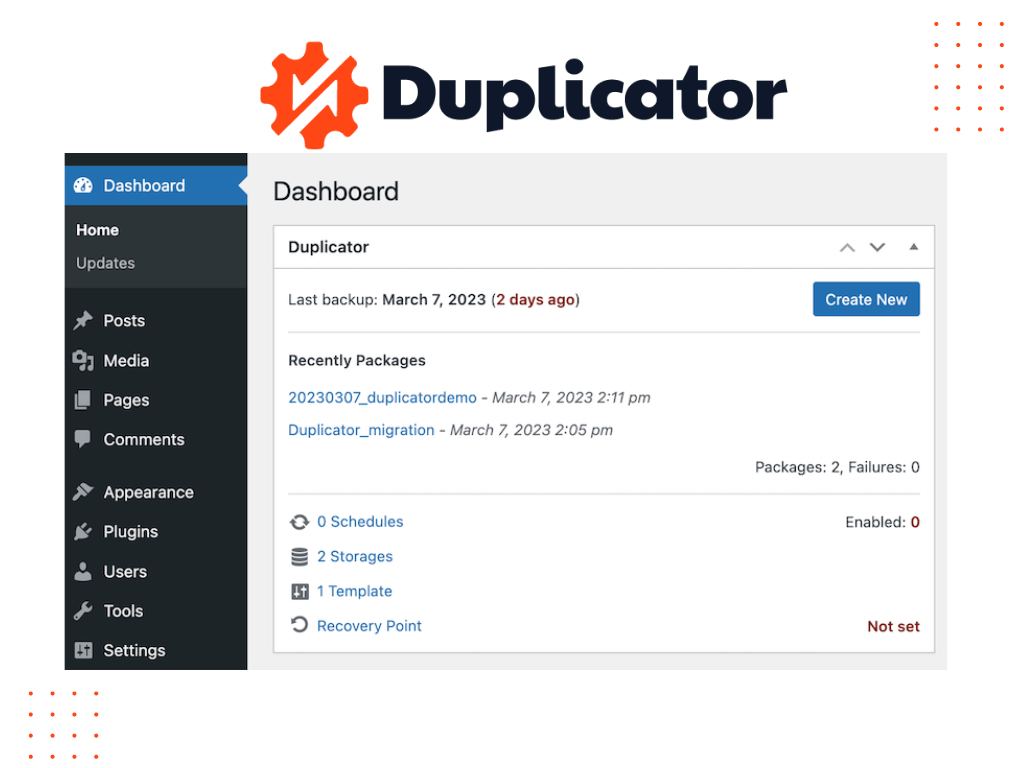
Key Features:
- Website migration and cloning capabilities
- Easy backup creation for WordPress sites
- Bundles all files, themes, plugins, and database into a single package
- Ability to move or duplicate sites between different servers or hosting providers
- Support for creating staging or development sites
- Scheduled backups for automatic and regular site backups
- Ability to exclude specific files or database tables during backup or migration
- Restoration of backups with simple import functionality
- Support for larger sites with chunked backups option
- Detailed logging and reporting for backup and migration processes.
Cons:
- Large websites with extensive data might experience longer backup or migration times.
- Certain server configurations may cause compatibility issues.
- Free version lacks some advanced features available in the premium version.
- Updates may occasionally introduce minor bugs or compatibility problems.
- Limited customer support for free users.
- Restoring large websites from backups might require more server resources and time.
Pricing:
Duplicator has both a free version and a premium version with different pricing plans.
Alternatives:
UpdraftPlus, All-in-One WP Migration, and BackupBuddy
9. Sucuri
Sucuri is a security plugin and web application firewall (WAF) service designed to enhance the security and protection of WordPress websites. It is widely used by website owners and administrators to safeguard their sites from various online threats, such as malware, DDoS attacks, and other malicious activities.
Key Features:
- Website security monitoring and scanning
- DDoS protection and mitigation
- Web Application Firewall (WAF)
- Malware removal and cleanup
- Website blacklist monitoring and removal
- Content Delivery Network (CDN) for improved performance
- SSL certificate support for secure connections
- Incident response and customer support
- Website integrity monitoring
- Virtual patching for immediate vulnerability protection.
Cons:
- High renewal cost after the initial subscription period.
- Some users may find the interface and dashboard a bit overwhelming.
- The basic plan may have limitations for larger websites or high-traffic businesses.
- The firewall rules can sometimes be too restrictive, causing false positives for legitimate traffic.
- Advanced features and options are available only in higher-tier and more expensive plans.
- Customer support response times may vary, and some users have reported slower assistance during peak times.
- Customizing certain settings may require technical knowledge.
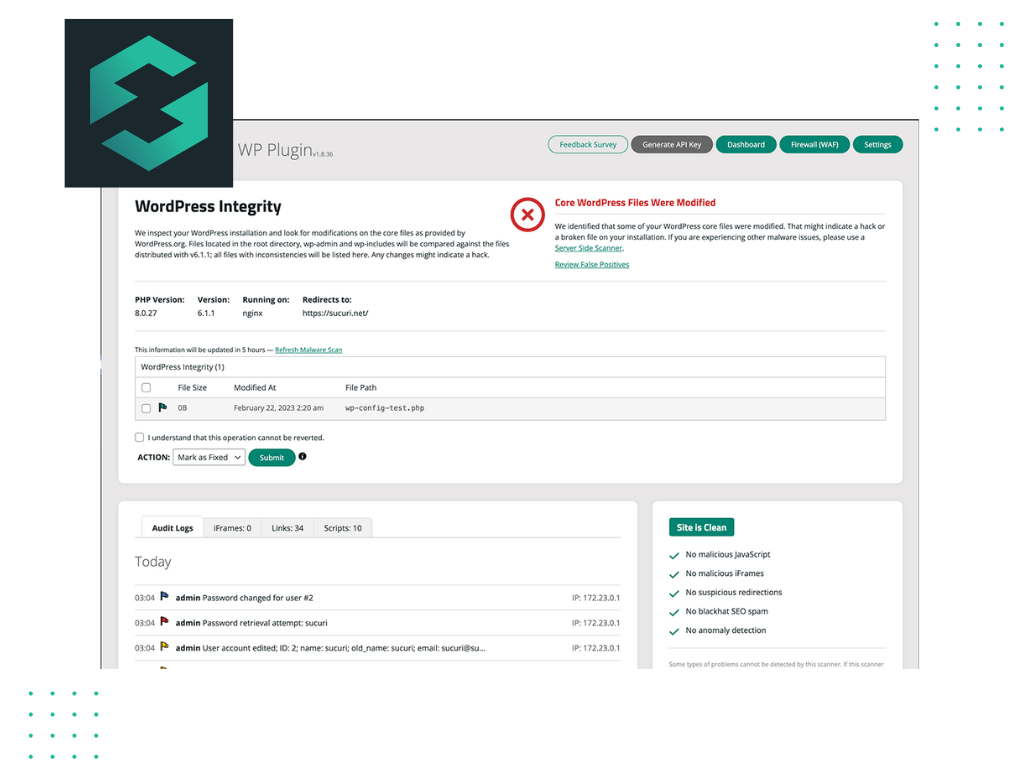
Pricing:
Sucuri has a premium version only.
Alternatives:
Wordfence, SiteLock, and MalCare
10. Hub Spot
Businesses rely on HubSpot to efficiently manage marketing, sales, and customer service activities. This helps companies to achieve higher productivity and growth.
Key Features:
- All-in-one inbound marketing, sales, and customer service platform
- Customer Relationship Management (CRM) system to manage contacts and sales pipeline
- Marketing automation tools for creating and managing campaigns
- Email marketing capabilities with personalized content and tracking
- Website and landing page builder with customizable templates
- Social media management and monitoring
- Lead capture and management through forms and pop-ups
- Analytics and reporting to track marketing and sales performance
- Integration with various third-party apps and services
- Sales automation with lead scoring and automated follow-ups
- Customer service ticketing and support ticket management
- Live chat and chatbot capabilities for customer engagement
- Knowledge base and FAQ for self-service customer support
- Mobile app for on-the-go access to key features
- Personalization features for targeted marketing and content recommendations
Cons:
- Expensive pricing for certain features and add-ons
- Limited customization options, especially for advanced users
- Integration limitations with some third-party tools and platforms
- Some users find the reporting and analytics features to be inadequate
- Reliance on internet connectivity for cloud-based access
- Possibility of data privacy concerns due to cloud storage
- Issues with email deliverability and spam filtering
- Lack of a native CRM mobile app for some platforms
- Difficulty in handling large volumes of data efficiently.
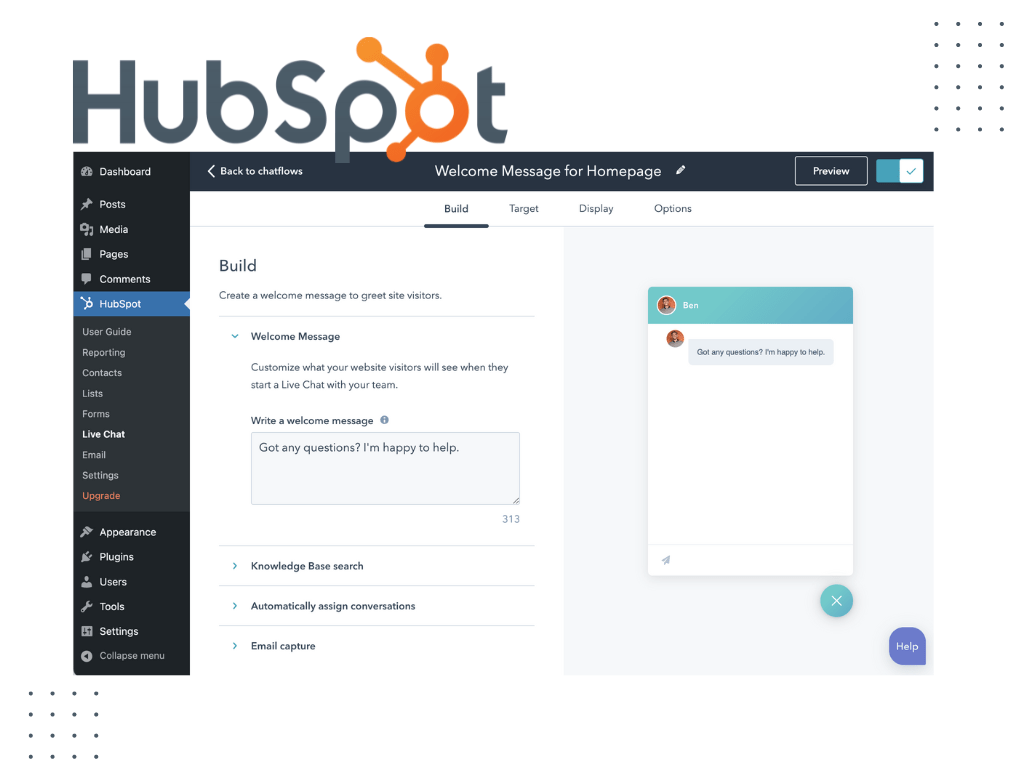
Pricing:
HubSpot has both free and premium versions.
Alternatives:
11. Broken Link Checker
The Broken Link Checker is a plugin designed to identify and detect broken or dead hyperlinks on websites.
Key Features:
- Scans websites for broken links
- Detects broken internal and external links
- Provides real-time notifications for broken links
- Supports bulk link checking
- Offers customizable settings for link scanning frequency
- Allows filtering of link types to check (e.g., images, videos, etc.)
- Provides options to automatically unlink or update broken links
- Supports exclusion of specific URLs from scanning
- Generates comprehensive reports with broken link details
- Integrates with popular content management systems (CMS)
- User-friendly interface for easy navigation and management
Cons :
- High resource usage and server load when scanning large websites
- Potential false positives and false negatives in detecting broken links
- May not work effectively with dynamically generated content
- Can lead to increased HTTP requests and slow down website performance
- Some broken link checkers might not be compatible with certain platforms or frameworks
- Over Reliance on automated tools may neglect manual checks for more nuanced issues
- Frequent scans and notifications can be overwhelming and distract from other important tasks
- Some broken link checkers might not handle complex website structures accurately
- Incompatibility with certain link shortening services or URL structures.
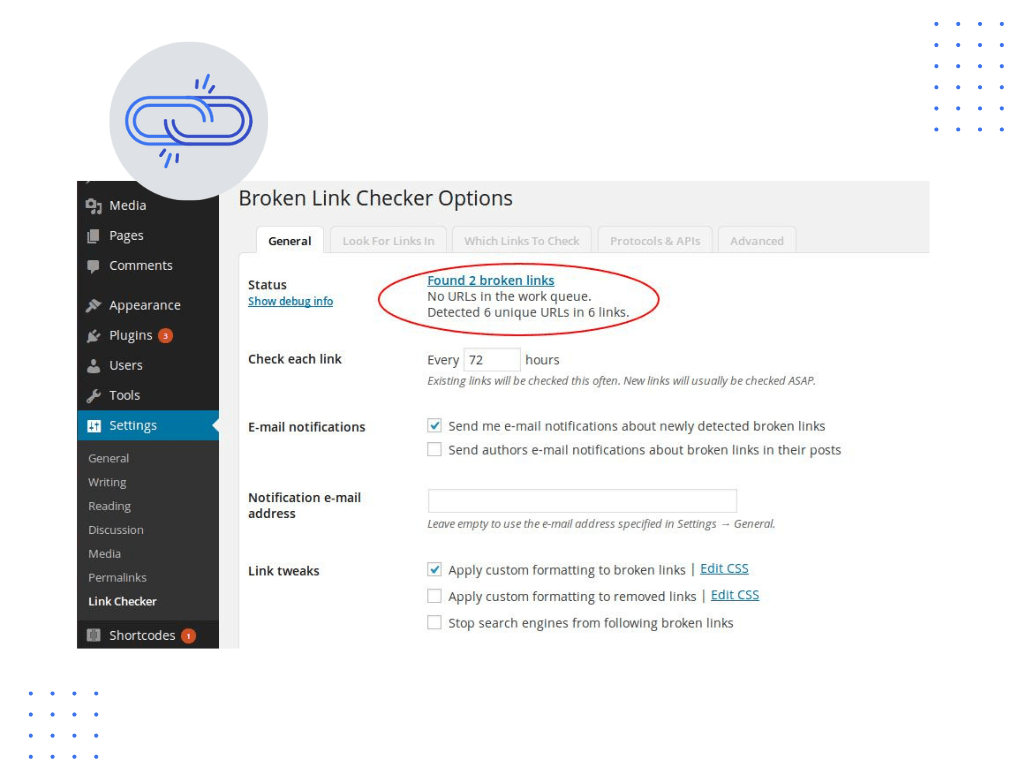
Pricing:
The Broken Link Checker plugin has both premium and free versions.
Alternatives:
W3C Link Checker, Dead Link Checker, and Online Broken Link Checker
12. Schema – All In One Schema Rich Snippets
One specific type of schema markup is called “All In One Schema Rich Snippets.” It is a plugin or tool commonly used on websites built on WordPress. The primary purpose of this plugin is to help website owners or administrators create rich snippets for search engine results.
Key Features:
- Provides support for various schema types such as reviews, events, recipes, articles, products, etc.
- Generates rich snippets that enhance search engine results with structured data.
- Helps search engines understand content better and display relevant details in SERPs.
- Improves click-through rates by presenting more informative snippets.
- Offers customization options to control the appearance of rich snippets.
- Supports multiple schema markup formats, including Microdata and JSON-LD.
- User-friendly interface for easy implementation of schema markup.
- Works well with most WordPress themes and plugins.
- Regularly updated to stay compatible with the latest SEO practices and schema standards.
Cons :
- Limited customization options for the appearance and format of rich snippets.
- May not support all types of content or structured data, leading to incomplete or inaccurate rich snippets.
- Dependency on the plugin’s updates and maintenance for compatibility with the latest web standards and search engine changes.
- Potential conflicts with other plugins or themes, resulting in technical issues on the website.
- May not be compatible with all WordPress themes, restricting its usability for certain websites.
- Users may experience a learning curve to understand and configure the plugin’s settings properly.
- The plugin’s effectiveness is dependent on the accurate input of structured data, which could be challenging for some users.
- Lack of ongoing support and updates, especially if the plugin becomes outdated or abandoned by its developers.
- The plugin’s use of structured data may not always align with Google’s changing guidelines, leading to potential SEO issues.
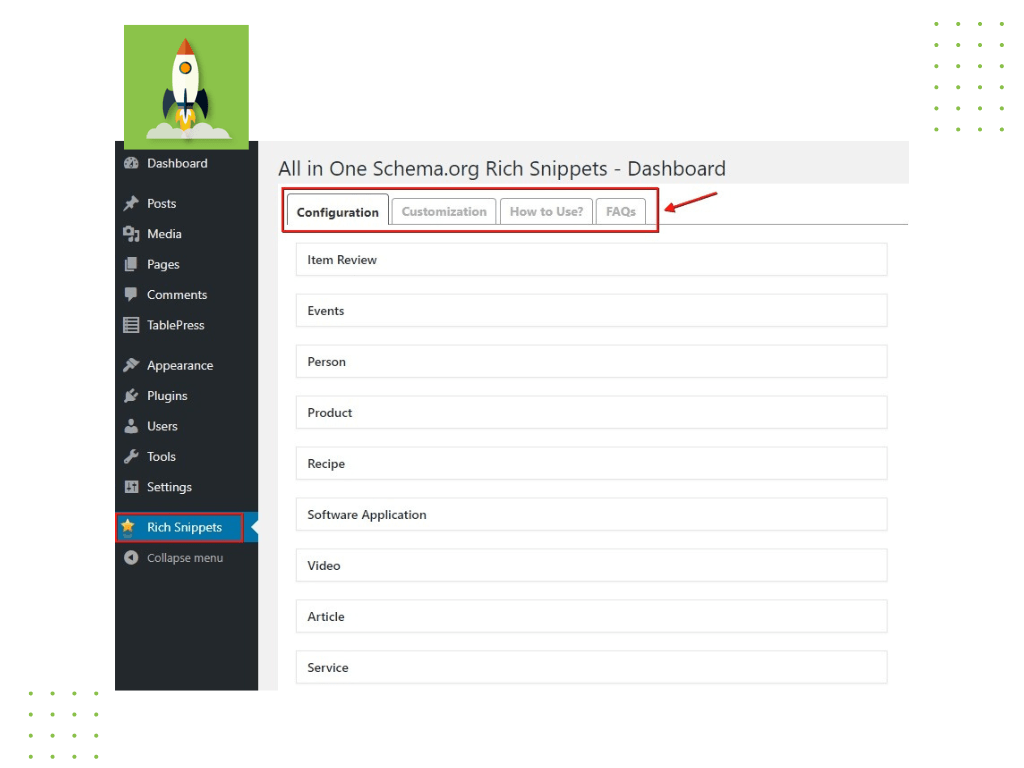
Pricing :
The “All In One Schema Rich Snippets” plugin has both premium and free versions.
Alternatives :
WP Rich Snippets, WP SEO Structured Data Schema
13. Google Analytics
Google Analytics is a web analytics service offered by Google. It helps website owners and marketers to track and analyze various aspects of their website’s performance and user interactions. It provides valuable insights into how users find and navigate through a website, their behavior, and their interactions with specific content.
Key Features
- Website traffic analysis
- Real-time reporting
- Audience segmentation
- User behavior tracking
- Conversion tracking
- Goal and event tracking
- E-commerce tracking
- Mobile app tracking
- Customizable dashboards
- Custom reporting
- Multi-channel attribution
- A/B testing integration
- Cohort analysis
- Geographic and demographic insights
- Benchmarking against industry standards
- Integrations with other Google products (e.g., Google Ads)
- Data privacy and security measures
Cons
- Data privacy concerns due to the collection and storage of user information.
- Possibility of inaccuracies in the data, such as tracking errors in reporting.
- Reliance on cookies, which can be blocked or deleted by users, leading to incomplete data.
- Limited real-time reporting, as Google Analytics data may have a slight delay.
- Potential performance impact on websites due to the added tracking code.
- Complexity for beginners, as the tool offers extensive features that may be overwhelming.
- Lack of support for cross-device tracking, leading to incomplete user journey understanding.
- Ad-blockers and privacy extensions may interfere with data collection, affecting accuracy.
- Dependency on internet connectivity for accessing data and reports.
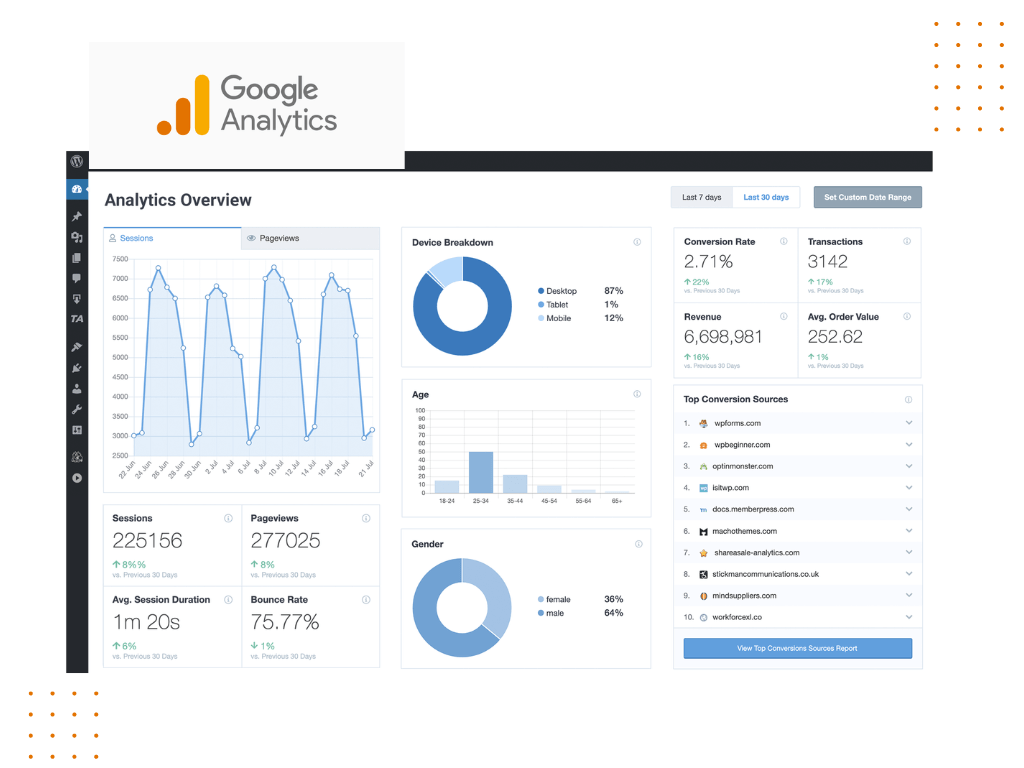
Pricing:
Google Analytics has both free and premium versions.
Alternatives:
- Matomo (formerly Piwik)
- Adobe Analytics
- Clicky
- Mixpanel
- Kissmetrics
In summary, these 13 essential WordPress plugins are like powerful tools that every small business needs. With these plugins, you can easily make your website work better, improve how visitors experience it, and add many useful features to help achieve your business goals.
FAQ
What are plugins in WordPress?
Plugins in WordPress are modular add-ons that extend the platform’s functionality. These tools enable users to easily integrate features, enhance performance, and customize their websites without extensive coding knowledge.
Which plugin is best for website?
Choosing the best plugin for your website depends on specific needs. For SEO, Yoast is popular. For e-commerce, WooCommerce excels. Evaluate requirements and consider user reviews for informed decisions.
Is WordPress plugin free?
Yes, WordPress offers a vast array of free plugins through its repository. These plugins add functionalities to your site.
Is WordPress better than coding?
Choosing between WordPress and coding depends on your needs. WordPress offers simplicity, flexibility, and a range of themes, while coding provides full control and customization.




